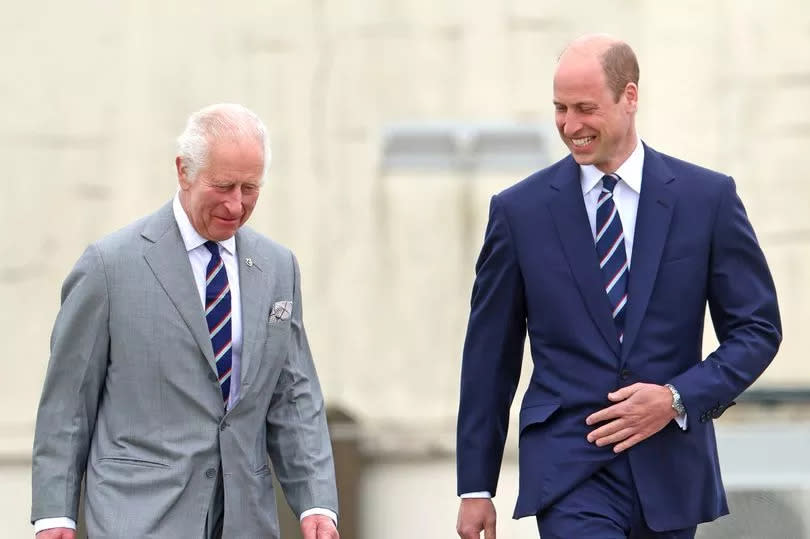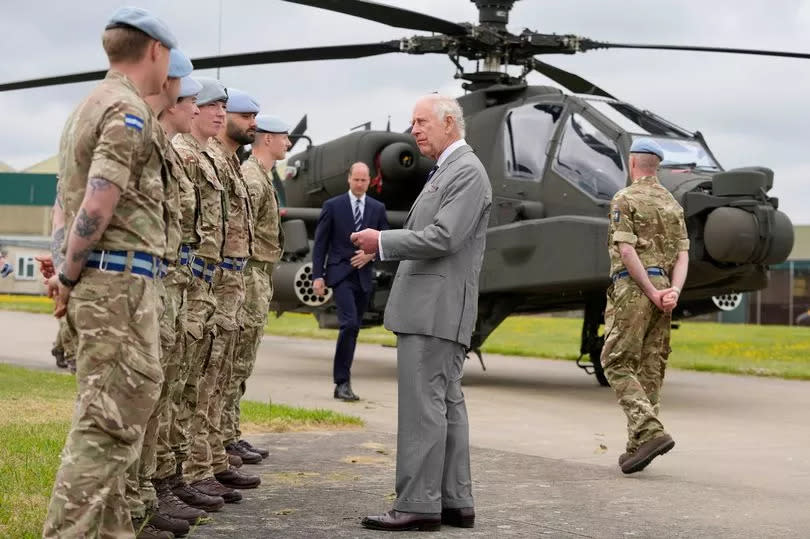King Charles shares health update and reveals he's lost sense of taste during cancer treatment
King Charles has shared that he lost his sense of taste during his cancer treatment, during a Royal visit with Prince William today.
The revelation came about while speaking to British Army veteran Aaron Mapplebeck, who underwent nine weeks of intensive chemotherapy last year for testicular cancer.
Mr Mapplebeck mentioned that he lost his sense of taste and the King remarked that it happened to him too.
The Royal visit took place at the Army Aviation Centre in Middle Wallop, Hampshire, where Prince William was officially made the Colonel-in-Chief of the Army Air Corps.
The royal father and son were seen to embrace and were all smiles for the symbolic handover, reports the Mirror.
King Charles praised William as a "very good pilot indeed" and expressed his pride in being involved with the Army Air Corp "all this time".
However, the King also expressed a touch of sadness as he officially handed over Colonel in Chief of the Army Air Corps to his son and heir. Speaking inside the Army Flying Museum at the Army Aviation Centre in Middle Wallop, Hampshire, Charles joked that the regiment will be left in safe hands.

"What a great joy it is to be here on this occasion," he told veterans, families and staff. "But also it is tinged with great sadness after 32 years of knowing you all and admiring your many activities and your achievements."
In his address, the King remarked: "Having had the pleasure of knowing you for so long I do hope you'll go from strength to strength in the future with the Prince of Wales as your new colonel in chief, the great thing is he's a very good pilot, so that's encouraging."
Significantly, the monarch did not make any remarks about Prince Harry during his speech.
Harry, who served with the regiment on his second tour in Afghanistan, was considered likely to be bestowed with the ceremonial title if he hadn't stepped away from duties.
For 32 years, the role was held by Charles, before it was announced last August that the title would pass to William.
Both sibling royals have undergone military flight training. However, while Harry has first-hand Army Air Corps experience over three-and-a-half years, William, as heir to the throne, was kept away from direct combat zones.
He instead used his training as a search and rescue and air ambulance pilot.
Upon reaching the Army Aviation Centre in Middle Wallop, Hampshire, the King was greeted by a Guard of Honour and Lieutenant General Sir Nicholas Borton, Colonel Commandant of the Army Air Corps.
As part of his visit, the King was escorted to The Army Flying Museum.

He also chose to take an unplanned stroll to chat with local schoolchildren from Middle Wallop School, who were present waving Union flags.
When he questioned whether their parents were affiliated with the Regiment, The King discovered that 60-70 per cent of them were indeed connected.
After making his way into the museum, which chronicles the history of British Army aviation from its inception to the current Army Air Corps, the King engaged in conversations with veterans, soldiers, and their families.
One such veteran, Aaron Mappleback, revealed to the King about his bout with testicular cancer where he undertook nine weeks of intensive chemotherapy last February.
He is currently almost one year post-treatment.
The monarch empathised about the common side-effect of "loss of taste" experienced by those undergoing cancer therapy, an issue he had previously raised during a visit to a London hospital two weeks prior.
After interacting with the gathered families, the royal unveiled a plaque marking the installation of the first Apache AH Mk. 1 in a UK museum while offering a brief speech.
Currently housed at The Army Flying Museum, this particular Apache was part of two units instrumental in transporting troops in the Battle of Jugroom Fort, Afghanistan, back in 2007.
The Duke of Sussex qualified as a commander for the same type of helicopter in 2013 following three years of comprehensive training.
While serving a five-month stint in Afghanistan, Prince Harry functioned as a co-pilot gunner, alternating between flying duties and maintaining command over the weapon systems onboard the two-seater Apache.
Charles vacated the museum premises and ambled across towards the Middle Wallop Control Tower following his departure.
Upon arrival, he was greeted by the Prince to ceremonially pass on the title of Colonel-in-Chief of the Army Air Corps.
The King handed him the regiment’s beret and stable belt in front of the Apache before speaking to serving aircrew.
As the King left, William embarked on his first engagement as the new Colonel-in-Chief.
He received a briefing on the Army Air Corps’ current work from the Colonel Commandant, Lieutenant General Sir Nicholas Borton.
They were stood in front of an Apache helicopter, the same as the type Prince Harry flew in service for his second tour of Afghanistan until 2014.
Prince Harry, who was in the Army Air Corps (AAC) for more than three years, qualified as an Apache commander in 2012.
King Charles revealed he had cancer earlier this year and is undergoing treatment.
Prince William's wife Kate is also undergoing treatment for cancer.
Get the latest celebrity gossip and telly news sent straight to your inbox. Sign up to our daily Showbiz newsletter here.

 Yahoo News
Yahoo News 
